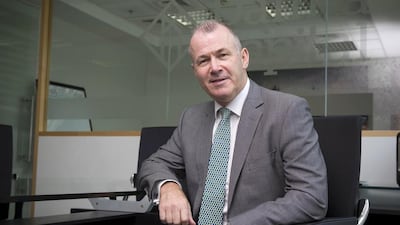Discipline. Managing risk. Avoiding losses. These are the skills and attributes of the hedge fund manager.
They are also arguably the characteristics of a military commander, which is why Howard Leedham, the chief executive of the Dubai-based hedge fund firm Dalma Capital, thinks the hedge fund industry was right for him.
Mr Leedham, in his 50s from Hampshire in Britain, spent a couple of decades in the British armed forces, beginning as a Royal Navy diver and ending up a special forces commando. After that, almost seamlessly, he joined the financial services business and helped to set up the first hedge fund in the DIFC, in 2005.
He explains his suitability for the hedge business graphically: “At the end of the day, it’s all about risk. If you can manage risk when the blood runs red, you can manage it when the colour is dollar green.”
Slightly chilling, but the hedge fund industry lends itself to military analogies. The shock troops of entrepreneurial capitalism before the financial crisis, the hedges took a pounding, reputationally and financially, during the rout of 2009.
They battled back, fought a series of skirmishes with regulators around the world who blamed them (among others) for the markets’ retreat, and now find themselves among the financial elite once more, and increasingly gaining recruits to their cause.
The value of global hedge fund investments stands at US$2.5 trillion, according to industry statistics. That is roughly the GDP of Britain, all in the hands of financial managers whose basic selling point is that they will reduce the risks to wealth from uncertain events or markets.
“A real hedge fund doesn’t aim to outperform a bull market, but it does seek to protect the downside in falling markets,” says Mr Leedham.
Some of the GCC’s biggest investors believe he is right. Abu Dhabi Investment Authority (Adia), the UAE capital’s sovereign wealth fund, has tens of billions of dollars in hedge funds under its “alternative investments” category, and executives there are, privately, pleased with their performance during and since the crisis.
That does not mean, however, that the hedge fund business is thriving in the region. There are about 12 hedges in the UAE, mostly DIFC-registered, Mr Leedham estimates, which is a small proportion of the global industry and unreflective of the Gulf’s growing financial firepower.
“The reason is that many institutions often have to invest in hedges in jurisdictions that have reached a certain watermark for standards. These are usually places in EU jurisdiction, like Dublin, Malta and Luxembourg,” Mr Leedham says.
“It is not a reflection on the DIFC or the DFSA [Dubai Financial Services Authority], which have a very robust regime compared to the rest of the world and which is also business-0friendly. It is simply the institutions will not, or mostly cannot, go for it here.”
He thinks the answer is for local investors to follow Adia’s example and put more of the region’s huge capital liquidity into hedge fund investments.
“What I would like to see is local institutions and investors deciding to support and encourage the hedge fund industry within the UAE. Hedges tend to gather in clusters, we’ve seen this in New York and London. I’m sure this will happen in the region too, but the UAE should be first there before somebody else pinches the idea.
“It has to be home-grown. It needs a local investor, a big institution or corporate, to allocate, say, $500 million to hedge funds and say that they will only invest it through UAE-registered funds. That’s how it will grow,” he says.
That is not an appeal for a helping hand. “It will make them a good return,” he insists.
His previous Dubai effort in hedges in 2005, DIFC-registered Argent, was wound up profitably by its US owner.
“I saw an opportunity then for hedge funds in Dubai, but really it was too early. There was no great understanding of what hedge funds were, and in any case the crisis was under way,” he says.
The current fund offered by Dalma, the Unified Return Fund, has been a while in preparation. Six years of development planning was based on back-testing of global markets over the previous 47 years (the extent of accurate historical data).
It has been running two years, and was opened to qualified investors in July. By next month, Mr Leedham believes the fund will have attracted more than $12m from investors lured in by the two year performance – a total return of nearly 38 per cent, and compound annual rate of return of 17.35 per cent. It has outperformed the standard hedge fund equity index by some way.
How do Mr Leedham and his team (who are all part-owners of Dalma) do it? He explains his performance by reference to some complex-looking charts, and uses industry argot rich in “evaluation models”, “tactical allocation”, and “aggregate markets”.
But the basic investment thesis is to stick with developed markets, which account for some 90 per cent of investments. “We want to keep risks low, so we focus on markets we know, and where we have information. We’re not big in Asia and Africa because we just don’t have the data on which to make investment decisions,” he explains.
Barring what he calls “black swan events”, he sees developed markets as doing pretty well over the next 12 months, especially with the US election cycle starting to crank up.
But Dalma does monitor local and regional markets. “I’m pleased to say that one of our portfolio managers called the fall in UAE markets in the spring, then he saw the turn and bought at the bottom. That’s pretty good,” says Mr Leedham.
fkane@thenational.ae
Follow The National's Business section on Twitter

